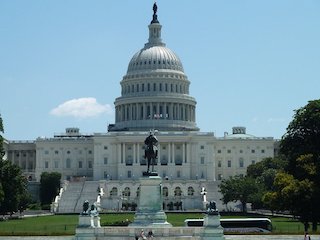UPDATE The Senate passed a bipartisan bill Wednesday that would provide $52 billion in subsidies to domestic semiconductor manufacturers and invest billions in science and technology innovation. The measure is a bid to strengthen the United States’ competitiveness and self-reliance in what is seen as a keystone industry for economic and national security.
In a 64-33 vote, the Senate passed the $280 billion “CHIPS and Science Act,” a slimmed-down final iteration of a bill that was years in the making, notes The Washington Post. About $52 billion would go to microchip manufacturers to incentivize construction of domestic semiconductor fabrication plants — or “fabs” — to make the chips, which are used in a variety of products, including cell phones, cars, medical equipment and military weapons. A shortage of semiconductor chips during the coronavirus pandemic has caused price hikes and supply-chain disruptions in several industries.
The bill also includes about $100 billion in authorizations over five years for programs such as expanding the National Science Foundation’s work and establishing regional technology hubs to support start-ups in areas of the country that haven’t traditionally drawn big funding for tech.
The bill next moves to the House, where Speaker Nancy Pelosi (D-CA) has said it has support for passage. Key members of Congress have said they could have the bill on President Biden’s desk by the end of the week, reports The Washington Post.
Commerce Secretary Gina Raimondo has been spearheading the White House’s efforts to lobby for the bill, Inside Towers reported. She noted the United States used to make 40 percent of the world’s chips but now makes about 12 percent — and “essentially none of the leading-edge chips,” which come almost entirely from Taiwan.
The United States has invested “nearly nothing” in semiconductor manufacturing, she said, while China has invested $150 billion to build its domestic capacity. Raimondo also said it was critical for the United States to be able to compete with countries around the world that have been providing subsidies to semiconductor companies to build factories.
“The chips’ funding will be the deciding factor on where those companies choose to expand,” Raimondo said. “We want them, we need them, to expand here in the United States.”
On Wednesday, Sen. Roger Wicker (R-MS), a key GOP negotiator on the legislation, argued there was no more important competition than the one for “technological supremacy” between the United States and China, notes The Post. “The outcome will shape the global balance of power for decades and will impact the security and prosperity of all Americans,” Wicker said. “Regrettably, at this moment, we are not in the driver’s seat on a range of important technologies. China is. China and other nations are increasingly dominant in tech innovation, posing a massive threat to not only our economy but to our national security.”
USTelecom SVP Government Affairs Brandon Heiner called the action “a good first step toward addressing the supply chain shortages that concern America’s broadband providers. As we undertake a historic effort to build the networks of the future, we will continue to work with policymakers to ensure we have access to the equipment needed to connect all Americans.”
By Leslie Stimson, Inside Towers Washington Bureau Chief





Reader Interactions